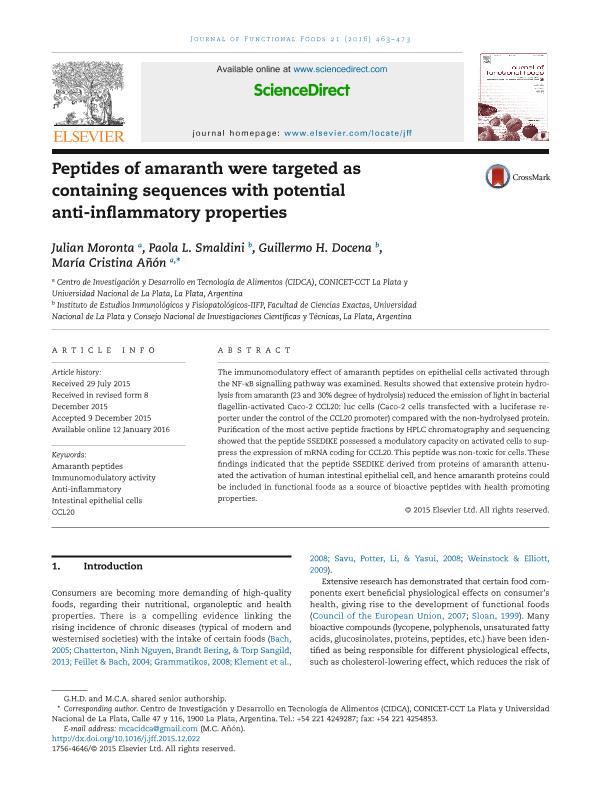Artículo
Peptides of amaranth were targeted as containing sequences with potential anti-inflammatory properties
Fecha de publicación:
03/2016
Editorial:
Elsevier
Revista:
Journal of Functional Foods
ISSN:
1756-4646
Idioma:
Inglés
Tipo de recurso:
Artículo publicado
Clasificación temática:
Resumen
The immunomodulatory effect of amaranth peptides on epithelial cells activated through the NF-κB signalling pathway was examined. Results showed that extensive protein hydrolysis from amaranth (23 and 30% degree of hydrolysis) reduced the emission of light in bacterial flagellin-activated Caco-CCL20: luc cells (Caco-cells transfected with a luciferase reporter under the control of the CCL20 promoter) compared with the non-hydrolysed protein. Purification of the most active peptide fractions by HPLC chromatography and sequencing showed that the peptide SSEDIKE possessed a modulatory capacity on activated cells to suppress the expression of mRNA coding for CCL20. This peptide was non-toxic for cells. These findings indicated that the peptide SSEDIKE derived from proteins of amaranth attenuated the activation of human intestinal epithelial cell, and hence amaranth proteins could be included in functional foods as a source of bioactive peptides with health promoting properties.
Archivos asociados
Licencia
Identificadores
Colecciones
Articulos(CIDCA)
Articulos de CENTRO DE INV EN CRIOTECNOLOGIA DE ALIMENTOS (I)
Articulos de CENTRO DE INV EN CRIOTECNOLOGIA DE ALIMENTOS (I)
Articulos(IIFP)
Articulos de INST. DE ESTUDIOS INMUNOLOGICOS Y FISIOPATOLOGICOS
Articulos de INST. DE ESTUDIOS INMUNOLOGICOS Y FISIOPATOLOGICOS
Citación
Moronta, Julián; Smaldini, Paola Lorena; Docena, Guillermo H.; Añon, Maria Cristina; Peptides of amaranth were targeted as containing sequences with potential anti-inflammatory properties; Elsevier; Journal of Functional Foods; 21; 3-2016; 463-473
Compartir
Altmétricas




